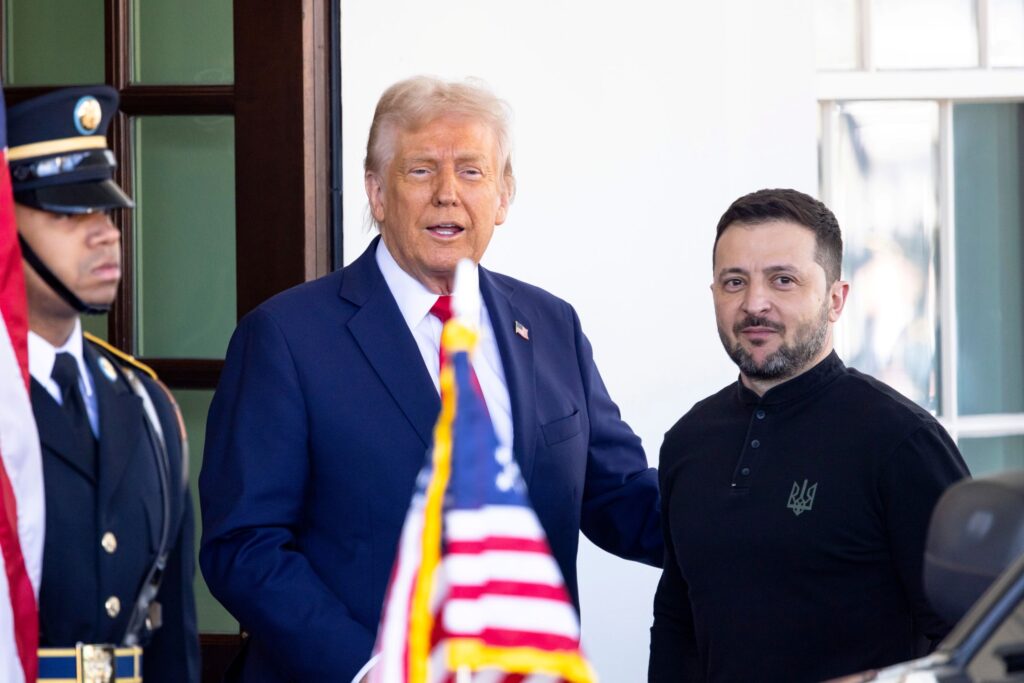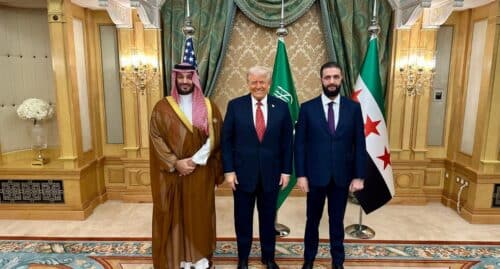
While the last echoes of battle are dying in the fields of Ukraine, the shape of a new world order is beginning to emerge. The peace accord between Russia and Ukraine, with the determined mediation of President Trump not only spells the end of a bloody war, but also signals a dramatic shift in the balance of world powers. Behind the diplomatic move is a broad American strategy aiming to sever the connection between Russia and the Chinese-Iranian axis and the reinstitution of American supremacy. Israel may just find itself in an unprecedented strategic footing in the emerging new world order. However, it must not lose its bearings and should remember that the road to a promised future goes through its independence and ability to protect itself – by itself.
The victor – Russia
On a local level, the agreement is a clear victory for Russia, which is ending the war after having attained most of the war objectives it had set for itself: blocking the membership of Ukraine in NATO, the weakening of Ukraine, and the gaining of huge swaths of land in the south and east of Ukraine (Donbass) it captured at the onset of the war in 2022, that the peace agreement leaves in its hands – alongside the Crimean Peninsula, that Russia had annexed in 2014.
Even the objective that Putin seemingly failed to achieve – the replacement of the Ukrainian government with a Russian puppet government – seems to be within his reach, at least partially. There is a reasonable chance that this agreement will undermine Ukraine President Zalenski and lead to the rise of pro-Russian, or at the very least – elements tolerant of Russia – in Ukrainian politics.
However, on a geopolitical level and in a global point of view, this move has ramifications that are much more far-reaching and is part of a broader strategy of the new American administration. The main American interest behind the uncompromising negotiations the administration conducted is simple – and is in reality no about Ukraine.
Pulling Russia away from China and Iran tp promote regional peace
The determined manner in which Trump foisted the agreement on both countries attests to how resolute the US is to pull Russia away from China and dismantle the China-Russia-Iran axis. On part of the US, the worse side effect of the current war is that the sanctions imposed – justly – on Russia, had pushed it into the arms of China. On the general geo-strategic level, the partnering of Russia to China posed a real threat to the US’s global hegemony.
To draw Russia over to the West, Trump capitalized on both side’s weaknesses – both being fatigued from three years of war, Ukraine’s total dependence on military aid from the US to continue fighting the war, and Russia’s desire to protect its gains – to force them into an agreement. In return for the hefty diplomatic (territorial???) gains Trump is bestowing on Russia, the latter will reciprocate by choosing America’s side and pull away from China and Iran.
Over 200,000 people were killed in recent years in conflicts around the globe, as a result of the US’s withdrawal from areas under its control. Now it is moving to restore its status as a global super-power and is taking it upon itself to fashion a new world order that aims to prevent a third world war and promote peace over war and anarchy. Trump understands all too well that the US cannot affect this change from a position of weakness and that any aspiration to reconcile Russia and Ukraine must come only from a position of power.
Tight Russia-Iran relations hurt Israel
What does this entail is far as Israel is concerned?
Trump’s move may have positive ramifications on Israel’s national security – both on a global level of a shift of powers between west and east and regionally.
In the years prior to the outbreak of the Russia-Ukraine war in February 2022, Israel enjoyed collaborations with Russia in several critical areas. One of them was the security coordination mechanism between the two in Syria that allowed Israel to push back any attempt by Iran to gain a foothold in the country and Hezbollah to operate there, without friction with the Russian forces deployed in Syria. Thanks to these relations, Israeli had free rein to act against Iranian arms convoys and terror infrastructures, without risking any deterioration with its relations with Moscow.
Moreover, on the international stage Russia maintained a balanced attituded toward Israel and even refrained from voting against it in the UN’s anti-Israel resolutions. Even if it was nowhere near unconditional support of Israel, its position gave Israel a certain diplomatic shield in face of international criticism. In addition, the leaders of Israel and Russia had direct ongoing dialogue that contributed to mutual understanding and the assuaging of tensions around regional issues, while preserving Israeli critical national security interests.
However, since the outbreak of the Ukraine war, Russia’s attitude toward Israel has markedly changed. It had significantly tightened relations with Iran, whose status received a considerable upgrade as a military partner of Moscow. Iran supplies Russia with suicide drones and additional weapons, which Russia used in its war against Ukraine. In return, Russia supports Iran in international institutions and supplies Iran with advanced military technology. Moscow’s support of Tehran boosted Iran’s confidence, prompting it to take action against Israel.
In the diplomatic arena, Russia no longer takes a balanced stand on Israel as it did. Thus, for instance, on October 2023 it promoted a draft resolution in the UN Security Council for an immediate ceasefire in Gaza, in which it refrained from condemning Hamas. This move reflected just how much Russia’s attitude had changed and the waning of its international support of Israel.
Israel can gain from Russia’s renewed presence in the region
In this context, the tightening of relations between Russia and the US could benefit Israel strategically. The less Russia is dependent on Iran – militarily and economically – the more its interests in collaborating with hostile elements to Israel are likely to wane. A renewed collaboration between Moscow and Washington could relax the tensions in the international arena and bring Russia back to its balanced stance toward Israel.
Moreover, it is even likely that Russia would renew its presence and involvement in the Middle East, under the auspices of the US. The creation of a Russian sphere of influence in the Allawi area of Syria could contain any radical Sunni element and thwart Turkey’s expansion aspirations by buffering between it and Lebanon and part of Syria.
US–Russian cooperation may even lead Russia to reverse its position against Israel in the UN Security Council, at least partially, whether actively or by abstaining from voting for resolutions against it. Hopefully, the US will demand that Russia – in return for handing them the victory over Ukraine – will act seriously toward the promotion of America’s interests, including the strengthening of Israel.
Beyond that, Trump’s rejection of Ukraine made it clear to European countries that they can no longer bank on America’s military protection, and that they will have to double their efforts to arm themselves so that they are prepared for every contingency – wither through Russia or otherwise. Europe has some of the world’s largest weapons industries, however, its countries may acquire arms, weapons and military technology from Israel’s defense industry, which would boost Israel’s economy and diplomatic status.
The key to realizing Trump’s vision is in Israel
Israel can benefit not only from Trump’s move with Russia and Ukraine, but also from the consequent world order that can be expected from this move. The new administration in America made it clear that it is determine to jettison any extra weight, like its unbeneficial relations with Ukraine, and shift its focus to more favorable sources such as Israel.
The reason that although the US is no longer interested in continuing arming Ukraine it sends large shipments of arms to Israel, is that Israel is not only a more attractive and profitable investment in Trump’s mind – but also a pivotal element in his overall strategy.
The new order Israel is generating in the Middle East stems among others from its weakening of Iran, Hezbollah and Hamas and its protection of the Druze in Syria, which serves America’s interests without it having to put in the work itself, thus saving hundreds of billions of dollars. Hence, for every dollar the US invests in Israel, it yields hundreds of percent in profits. The obvious conclusion is that Israel must end the multi-arena conflicts in which it is currently engaged in a clear and decisive victory, thereby proving to the US that it is in its interests to continue its investment in Israel.
It seems that Trump realized that the State of Israel is key to the realization of his vision for the Middle East. The dramatic geopolitical changes that are taking shape under his leadership have the potential to make Israel a global key player, a “Singapore of the Middle East” – a state that serves as a main route for all global transport. The realization of this vision would award Israel not only with supervision and energy security, but also would seriously boost of its international status.
Israel will protect itself – by itself
And yet, America’s cold shoulder to Ukraine is a harsh reminder that if a nation cannot protect itself – no one will do so for it. For Israel the conclusion is clear – just like the Zionist movement understood in its inception over 100 years ago, the Jewish nation and the State of Israel must defend themselves by themselves.
What does this mean in practice?
This means that the State of Israel must reduce to the greatest possible extent any dependence it has on the foreign arms and energy supplies, and geopolitical security. It must develop a large-scale production line of armaments to ensure its independence and flexibility of not having inventories dictate its abilities. The IDF must regain its large scale, and reestablish itself as a powerful military that is ready for any contingency. At the same time, Israel must ensure it has a diversified and robust energy economy and it must reinvest in its agricultural sector to ensure its food security.
In tandem with reenforcing its independence in these areas, Israel must expand its collaborations with countries with common interests and become a regional and global player, while unwaveringly defending the Jewish people’s sovereignty over the Land of Israel. Israel must acquaint itself deeply with the motivations of every player in the regional geopolitical field, and identify which countries it can establish cooperations toward common causes, and which moves on that field can serve it and which must be blocked.
“It was only the audacity of the Jews that established the State of Israel”, famously said Israel’s founding father, David Ben Gurion. It is clear that still today, only the audacity of the Jews will ensure the lasting existence of the state, even as a pivotal player in a new world order.





